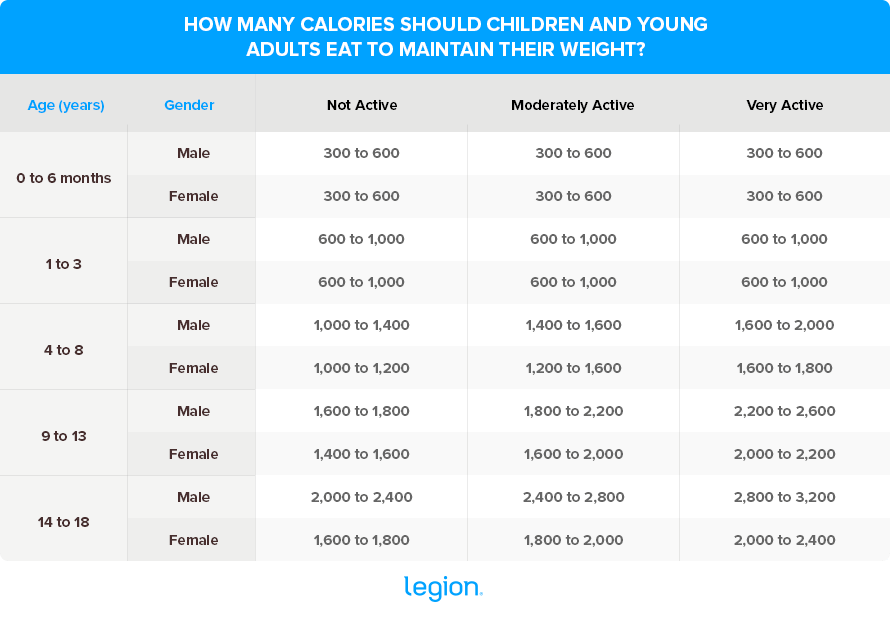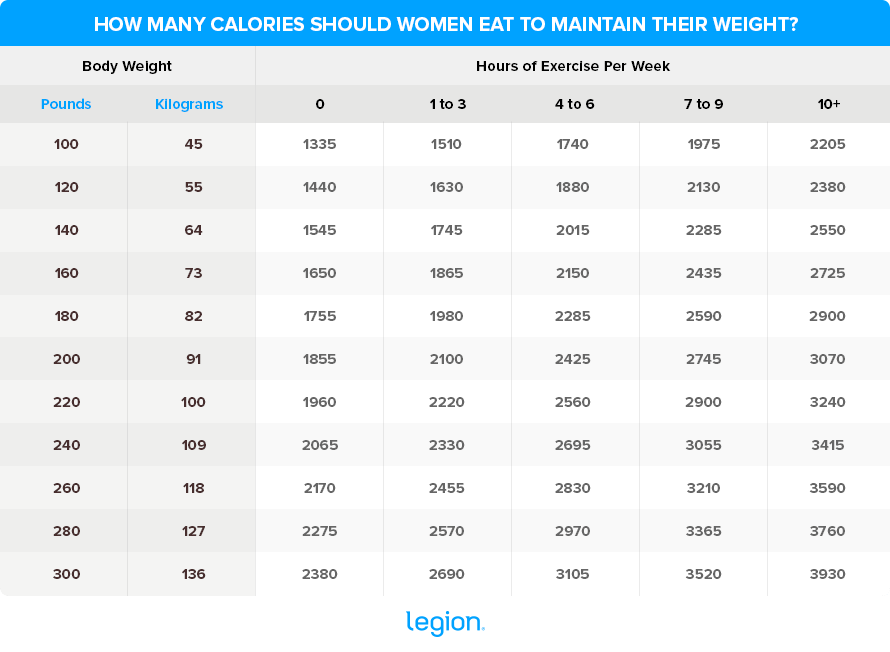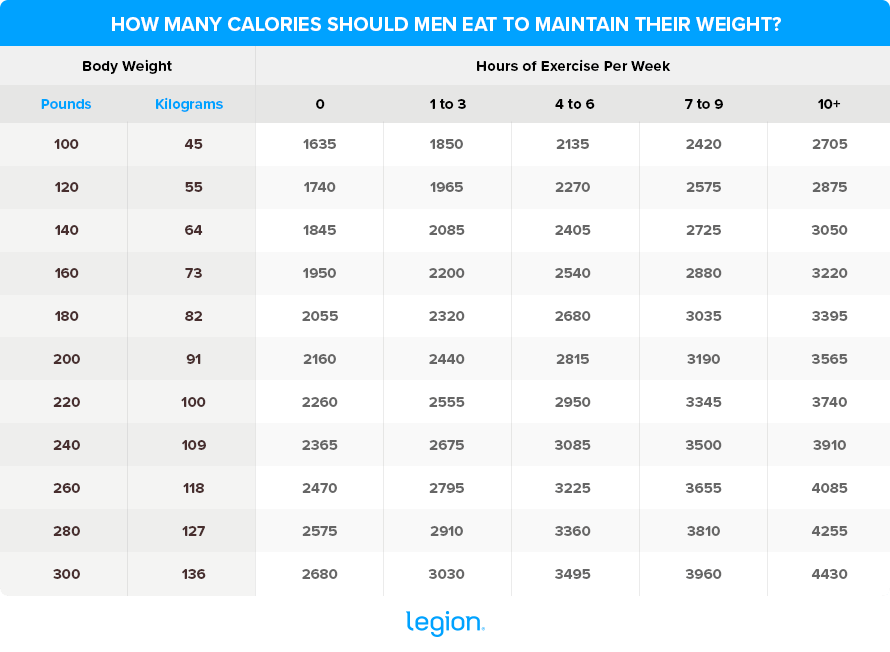You probably know that if you want to lose fat, gain muscle, or maintain your weight, you need to control how many calories you eat.
What most people don’t know is how many calories they should eat to reach those goals.
You’ve probably also heard that men should eat 2,500 calories per day to maintain their weight and women should eat 2,000 calories per day.
The truth is, those numbers are only rough averages—they only work for some people, some of the time.
A better approach is to estimate your calorie needs based on your body, lifestyle, and goals—and then adjust based on how your body responds.
That’s exactly what this guide will show you how to do.
You’ll learn how to calculate your daily calorie needs, how to adjust them for fat loss or muscle gain, and how to make your diet easier to follow.
Want to know exactly what diet to follow to reach your fitness goals? Take our free 60-second quiz and find out now.
Key Takeaways
- A calorie is a unit of energy used to measure the energy in food and the energy your body burns throughout the day.
- The number of calories you should eat depends on your body size, activity level, age, and goals. It’s different for everyone, so generic guidelines like 2,000 for women and 2,500 for men rarely work.
- Most active women need around 1,700 calories per day to maintain weight, and most active men need about 2,200. Overweight people usually need more.
- To lose weight quickly and healthily, eat about 20-to-25% fewer calories than you burn daily. This drives fat loss with minimal muscle loss or side effects.
- To gain muscle with minimal fat gain, eat about 5-to-10% more calories than you burn daily.
- Planning your meals in advance makes hitting your calorie and macro targets far easier than trying to track everything on the fly or eating intuitively.
- To accelerate fat loss, consider taking caffeine, yohimbine, and a fat burner. To boost muscle growth, performance, and recovery, take protein powder, pre-workout, and creatine.
Table of Contents
+
What Is a Calorie?

A calorie is a unit of measurement for energy.
One calorie is the energy it takes to heat one kilogram of water one degree Celsius (also called a kilocalorie or Calorie with a capital “C”).
We use calories to measure the energy in food and the energy our bodies burn throughout the day.
How Many Calories Should You Eat to Maintain Your Weight?

How many calories you should eat per day to maintain your weight depends on a variety of factors, including your:
- Body weight
- Body fat percentage
- Activity levels
- Age
- Diet
- And a few other variables
In other words, the number of calories you need to maintain your weight is individual, and also changes over time. That said, you can usually arrive at a decent estimate of your current calorie needs using just your body weight and activity level.
Women
Most physically active women aged 20-to-50 who aren’t following a structured workout program need around 1,700 calories per day to maintain their weight.
Women over 50 sometimes need slightly fewer calories than this, mostly because they have less muscle mass and are less active. Although your metabolism does decline slightly with age, most of the decrease is due to exercising less and losing muscle mass—not an innate drop in your metabolism.
The good news is exercise and eating a healthy, high-protein diet can offset much of this decline.
Women under 20 often need more than this, although their calorie needs vary greatly depending on how active they are. In other words, being young doesn’t necessarily mean you should eat more than older folks—it depends on your activity levels.
Ironically, overweight women (BMI over 25) typically need more calories than lean women to maintain their weight. That’s because carrying extra body weight burns more energy—sometimes over 1,000 additional calories per day.
Men
Most physically active men aged 20-to-50 who aren’t following a structured workout program need around 2,200 calories per day to maintain their weight.
Men over 50 may need slightly fewer, mostly because they have less muscle and are less active—not because their metabolism “crashes” with age. Staying active and eating a healthy, high-protein diet helps offset this decline.
Younger men often need more, though this depends entirely on how active they are. Being young doesn’t automatically mean you can eat more calories—activity is what matters most.
Overweight men (BMI over 25) typically need more calories than lean men to maintain their weight, since moving and maintaining extra body mass burns significantly more energy—sometimes over 1,000 calories per day.
Children
Children need far fewer calories than adults, mostly because they’re smaller and burn less energy—even when they’re very active.
Many people think kids can eat as much as they want without worrying about weight gain, but the staggering rise in childhood obesity proves otherwise.
Even active children don’t burn many calories simply because they aren’t moving much body mass.
For example, babies only need to eat around 80-to-120 calories per kilogram of body weight per day to support healthy development. That means a 4-month-old baby weighing 18 pounds (~8 kg) would only need about 700 calories per day.
The average toddler (1-to-3 year old) only needs to eat about 1,000 calories per day. And the average kid between 4 and 10 years old only needs to eat around 1,200-to-2,000 calories per day depending on their age, body weight, and activity level.
Here’s a helpful chart for estimating how many calories your child should eat based on their age, sex, and activity level:

That said, these are rough estimates—not strict rules. Counting calories usually isn’t necessary (and can be counterproductive) for kids.
A better approach is to provide plenty of healthy food throughout the day, let them eat when they’re hungry, stop when they’re full, and make sure they stay active.
How Many Calories You Should Eat

There are three simple ways to estimate how many calories you should eat per day:
- Use the Legion Calorie Calculator: This is the most accurate method. Just enter your gender, weight, height, age, and activity level.
- Multiply your body weight in pounds by 14-to-16: Use the lower end if you’re a woman or less active, and the higher end if you’re a man or more active. This method is slightly less accurate, but fast and easy.
- Use the calorie charts below: These give rough estimates based on your gender, age, and activity level. They’re the least accurate, but also the quickest to use.


How Many Calories Should You Eat to Lose Weight?
To lose weight quickly without wrestling with muscle loss, extreme hunger, or poor performance in the gym, aim for a daily calorie deficit of around 20-to-25%.
Evidence that this is an effective strategy comes from research by the University of Jyväskylä. The researchers put athletes into either a 300-calorie (~10%) or 750-calorie (~24%) deficit while eating a high-protein diet and training as normal.
After four weeks, the 10% deficit group lost very little fat or muscle, while the 24% group lost about 4 pounds of fat and very little muscle. Importantly, neither group reported negative side effects.
These findings also jive with my experience with my own body and the thousands of people I’ve worked with: a 20-to-25% calorie deficit is the sweet spot for sustainable, effective fat loss. For most people, that translates to losing about 1-to-2 pounds per week.
How Many Calories Should You Eat to Gain Muscle?
To gain muscle while minimizing fat gain, eat about 5-to-10% more calories than you burn each day.
For most people, this works out to 16-to-18 calories per pound of body weight per day. Stick to the lower end if you’re less active, and the higher end if you train hard and often.
The one exception is beginners.
When you’re new to strength training, your body is so responsive to its effects that you can build muscle even in a calorie deficit.
Thus, if you’re a newbie looking to gain muscle and lose fat, eat 20-to-25% fewer calories than you burn every day. Or, if you’re already lean and want to gain even more muscle, eat approximately the same number of calories as you burn daily.
If you want to make sure the weight you gain is mostly muscle—or the weight you lose is mostly fat—you also need to get your macros right. Learn how here:
How to Calculate Your Macros for Weight Loss & Muscle Gain
How to Count Calories

Whether you want to lose fat or build muscle, your results depend on consistently hitting your calorie target. Most people make this harder than it needs to be.
Some try to track everything they eat on the fly using apps like MyFitnessPal. While this works in theory, it’s tedious in practice. You waste time debating what to eat, second-guess portion sizes, and often forget to log meals altogether.
Others try to “eat intuitively,” hoping hunger and cravings will guide them on the right path. This can work if you’re already eating well and just want to maintain your weight, but it’s rarely accurate enough to drive meaningful fat loss or muscle gain.
A better approach is to plan your meals ahead of time.
Start with your calorie and macro targets, then build a meal plan containing meals you enjoy and that you’re happy to eat regularly. This saves time, reduces the number of decisions you have to make, and makes it easier to stay on track.
To learn how to put together a winning meal plan, check out this article next:
The Definitive Guide to Effective Meal Planning
Best Supplements for Fat Loss and Muscle Gain
No supplement can make you lose fat or build muscle on its own. But if you know how to drive fat loss or muscle gain through proper diet and training, the right ones can help you make faster, smoother progress.
Here are some worth considering:
Supplements to Boost Fat Loss
- Caffeine: 3-to-6 mg of caffeine per kilogram of body weight per day increases metabolic rate and helps you train harder while dieting. For a clean, delicious source of caffeine, try Legion’s pre-workout Pulse.
- Yohimbine: 0.1-to-0.2 milligrams of yohimbine per kilogram of body weight before fasted training increases fat loss and is particularly helpful with losing “stubborn” fat. Legion’s pre-workout fat burner Forge is a fantastic natural source of yohimbine.
- Fat Burner: Effective fat burners contain ingredients that boost the number of calories you burn and reduce hunger and cravings, making weight loss more straightforward. For a top-tier fat burner, try Legion’s fat burner Phoenix.
Supplements to Boost Muscle Gain
- Protein powder: Protein powder, such as Whey+ (Legion’s whey isolate) or Casein+ (Legion’s micellar casein), provides your body with the nutrients needed to build muscle tissue and recover from workouts.
- Creatine: Creatine boosts muscle and strength gain, improves anaerobic endurance, and reduces muscle damage and soreness from your workouts. For a natural source of creatine, try Legion’s creatine monohydrate, creatine gummies, or post-workout Recharge.
- Pre-workout: A high-quality pre-workout enhances energy, mood, and focus, increases strength and endurance, and reduces fatigue. For a top-tier pre-workout containing clinically effective doses of 6 science-backed ingredients, try Legion’s Pulse with caffeine or without.
Want personalized supplement advice based on your goals? Take the Legion Supplement Finder Quiz—in just 60 seconds you’ll know exactly what to take.
FAQ #1: How can I eat less without feeling hungry?
The easiest way to curb hunger when cutting is to make some simple changes to your diet.
Assuming you’re eating plenty of protein, the following tips can help you control your appetite:
- Eat more fiber (and soluble fiber in particular).
- Drink more water.
- Eat fewer calorie-dense foods. This means eating less cookies, sugary drinks, oils, and fatty meats, and the like, and more vegetables, fruits, legumes, and lean meat and dairy.
- Get enough sleep
READ MORE: 8 Ways to Improve Hunger Control and Weight Loss
FAQ #2: Should I eat less or exercise more to lose weight?
Both! Research shows that the most efficient way to lose fat and maintain (or gain) muscle is through a combination of calorie restriction and exercise.
Specifically, strength training is the most beneficial kind of exercise for weight loss, but it’s also helpful to do a moderate amount of “cardio” (endurance training) as well.
READ MORE: The Best Way to Lose Weight Fast with Exercise
FAQ #3: Can I eat more if I exercise more?
This depends on whether your goal is to lose weight, gain weight, or maintain your weight.
If your goal is to lose weight, you shouldn’t “eat back” the calories you burn working out. The calories you burn from exercise are already taken into account when you estimate your calorie needs using the methods explained in this article.
Thus, if you eat more to compensate for the calories burned during exercise, you’re just reducing the size of your calorie deficit and slowing down your weight loss (or halting it altogether).
If your goal is to gain weight, you should estimate how many calories you need to gain weight based on your current exercise program, and then adjust as needed. That is, if you aren’t gaining weight, gradually increase your calorie intake until you are.
If your goal is to maintain your weight, you should only increase your calorie intake if you start losing weight or significantly increase how much you’re exercising per week (which will cause you to lose weight if you don’t eat more).
READ MORE: Good Question: Should You Eat Back the Calories You Burn from Exercise?
Scientific References +
- Hunter, G. R., Singh, H., Carter, S. J., Bryan, D. R., & Fisher, G. (2019). Sarcopenia and Its Implications for Metabolic Health. In Journal of Obesity (Vol. 2019). Hindawi Limited. https://doi.org/10.1155/2019/8031705
- Dąbrowska-Galas, M., Dąbrowska, J., Ptaszkowski, K., & Plinta, R. (2019). High physical activity level may reduce menopausal symptoms. Medicina (Lithuania), 55(8). https://doi.org/10.3390/medicina55080466
- Milanović, Z., Pantelić, S., Trajković, N., Sporiš, G., Kostić, R., & James, N. (2013). Age-related decrease in physical activity and functional fitness among elderly men and women. Clinical Interventions in Aging, 8, 549–556. https://doi.org/10.2147/CIA.S44112
- Mandrup, C. M., Egelund, J., Nyberg, M., Enevoldsen, L. H., Kjær, A., Clemmensen, A. E., Christensen, A. N., Suetta, C., Frikke-Schmidt, R., Steenberg, D. E., Wojtaszewski, J. F. P., Hellsten, Y., & Stallknecht, B. M. (2018). Effects of menopause and high-intensity training on insulin sensitivity and muscle metabolism. Menopause, 25(2), 165–175. https://doi.org/10.1097/GME.0000000000000981
- Bueno-Notivol, Juan, et al. “Effect of Programmed Exercise on Insulin Sensitivity in Postmenopausal Women.” Menopause, vol. 24, no. 12, Dec. 2017, pp. 1404–1413, https://doi.org/10.1097/gme.0000000000000936. Accessed 5 Dec. 2019.
- Ryan, Alice S., et al. “Exercise with Calorie Restriction Improves Insulin Sensitivity and Glycogen Synthase Activity in Obese Postmenopausal Women with Impaired Glucose Tolerance.” American Journal of Physiology-Endocrinology and Metabolism, vol. 302, no. 1, 1 Jan. 2012, pp. E145–E152, https://doi.org/10.1152/ajpendo.00618.2010.
- Mason, Caitlin, et al. “Dietary Weight Loss and Exercise Effects on Insulin Resistance in Postmenopausal Women.” American Journal of Preventive Medicine, vol. 41, no. 4, Oct. 2011, pp. 366–375, https://doi.org/10.1016/j.amepre.2011.06.042. Accessed 2 Dec. 2021.
- Fothergill, E., Guo, J., Howard, L., Kerns, J. C., Knuth, N. D., Brychta, R., Chen, K. Y., Skarulis, M. C., Walter, M., Walter, P. J., & Hall, K. D. (2016). Persistent metabolic adaptation 6 years after “The Biggest Loser” competition. Obesity, 24(8), 1612–1619. https://doi.org/10.1002/oby.21538
- Hunter, G. R., Singh, H., Carter, S. J., Bryan, D. R., & Fisher, G. (2019). Sarcopenia and Its Implications for Metabolic Health. In Journal of Obesity (Vol. 2019). Hindawi Limited. https://doi.org/10.1155/2019/8031705
- Bhadoria, A., Sahoo, K., Sahoo, B., Choudhury, A., Sufi, N., & Kumar, R. (2015). Childhood obesity: Causes and consequences. Journal of Family Medicine and Primary Care, 4(2), 187. https://doi.org/10.4103/2249-4863.154628
- Sanyaolu, A., Okorie, C., Qi, X., Locke, J., & Rehman, S. (2019). Childhood and Adolescent Obesity in the United States: A Public Health Concern. In Global Pediatric Health (Vol. 6). SAGE Publications Inc. https://doi.org/10.1177/2333794X19891305
- Wen, W., Piao, J., & Zhuo, Q. (2010). [Energy requirements of children and adolescents]. In Wei sheng yan jiu = Journal of hygiene research (Vol. 39, Issue 6, pp. 790–794). Cambridge University Press. https://doi.org/10.1079/phn2005791
- Ben, X. M. (2008). Nutritional management of newborn infants: Practical guidelines. In World Journal of Gastroenterology (Vol. 14, Issue 40, pp. 6133–6139). Baishideng Publishing Group Inc. https://doi.org/10.3748/wjg.14.6133
- Huovinen, H. T., Hulmi, J. J., Isolehto, J., Kyröläinen, H., Puurtinen, R., Karila, T., Mackala, K., & Mero, A. A. (2015). Body composition and power performance improved after weight reduction in male athletes without hampering hormonal balance. Journal of Strength and Conditioning Research, 29(1), 29–36. https://doi.org/10.1519/JSC.0000000000000619
- Iraki, J., Fitschen, P., Espinar, S., & Helms, E. (2019). Nutrition Recommendations for Bodybuilders in the Off-Season: A Narrative Review. Sports, 7(7), 154. https://doi.org/10.3390/sports7070154
- Astrup, A, et al. “Caffeine: A Double-Blind, Placebo-Controlled Study of Its Thermogenic, Metabolic, and Cardiovascular Effects in Healthy Volunteers.” The American Journal of Clinical Nutrition, vol. 51, no. 5, 1 May 1990, pp. 759–767, https://doi.org/10.1093/ajcn/51.5.759.
- Astorino, Todd A., et al. “Effect of Caffeine Ingestion on One-Repetition Maximum Muscular Strength.” European Journal of Applied Physiology, vol. 102, no. 2, 13 Sept. 2007, pp. 127–132, https://doi.org/10.1007/s00421-007-0557-x.
- Tw, Beck, et al. “The Acute Effects of a Caffeine-Containing Supplement on Strength, Muscular Endurance, and Anaerobic Capabilities.” Journal of Strength and Conditioning Research, 1 Aug. 2006, pubmed.ncbi.nlm.nih.gov/16937961/.
- Ostojic, Sergej M. “Yohimbine: The Effects on Body Composition and Exercise Performance in Soccer Players.” Research in Sports Medicine, vol. 14, no. 4, Dec. 2006, pp. 289–299, https://doi.org/10.1080/15438620600987106.
- Mark, Millan, et al. Agonist and Antagonist Actions of Yohimbine as Compared to Fluparoxan at ?2-Adrenergic Receptors (AR)S, Serotonin (5-HT)1A, 5-HT1B, 5-HT1D and Dopamine D2 and D3 Receptors. Significance for the Modulation of Frontocortical Monoaminergic Transmission and Depressive States. Vol. 35, no. 2, 1 Feb. 2000, pp. 79–95, https://doi.org/10.1002/(sici)1098-2396(200002)35:2%3C79::aid-syn1%3E3.0.co;2-x.
- Stokes, Tanner, et al. “Recent Perspectives Regarding the Role of Dietary Protein for the Promotion of Muscle Hypertrophy with Resistance Exercise Training.” Nutrients, vol. 10, no. 2, 7 Feb. 2018, p. 180, www.mdpi.com/2072-6643/10/2/180/pdf.
- Eckerson, Joan M., et al. “Effect of Creatine Phosphate Supplementation on Anaerobic Working Capacity and Body Weight after Two and Six Days of Loading in Men and Women.” The Journal of Strength and Conditioning Research, vol. 19, no. 4, 2005, p. 756, https://doi.org/10.1519/r-16924.1.
- Bassit, Reinaldo Abunasser, et al. “Effect of Short-Term Creatine Supplementation on Markers of Skeletal Muscle Damage after Strenuous Contractile Activity.” European Journal of Applied Physiology, vol. 108, no. 5, 3 Dec. 2009, pp. 945–955, https://doi.org/10.1007/s00421-009-1305-1.
- Miller, T., Mull, S., Aragon, A. A., Krieger, J., & Schoenfeld, B. J. (2018). Resistance training combined with diet decreases body fat while preserving lean mass independent of resting metabolic rate: A randomized trial. International Journal of Sport Nutrition and Exercise Metabolism, 28(1), 46–54. https://doi.org/10.1123/ijsnem.2017-0221










